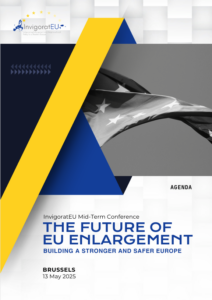Headquarters: Svetog Nauma 7, 11000
Office address: Đorđa Vajferta 13, 11000
Phone:: +381 11 4529 323

28 June 2021– A panel discussion “From Portugal to Slovenia: Towards the Post-Pandemic Future of Europe” organised by the European Policy Centre –CEP and the Delegation of the European Union to Serbia was held today at the EU Info Centre in Belgrade, in hybrid format.
“We always say that the Council Presidency has a big role in setting the agenda. This is even more crucial during the pandemic,”, said Mateja Norčić Štamcar, Deputy Head of the EU Delegation to Serbia.
When it comes to the inclusion of the Western Balkans countries in the processes at the EU level, Mateja added that “neither Serbia nor Western Balkans were not forgotten – they were integrated in the managing the COVID-19 crisis”.
Referring to the results of Portuguese Presidency of the EU Council, the Ambassador of Portugal to Serbia, H.E. Maria Virginia Pina pointed out that most targets have been achieved, such as the launch of the Conference on the Future of Europe, the EU digital COVID certificate, revision of the civil protection mechanism, the launch of Horizon Europe, Erasmus+, the European Solidarity and Creative Europe within the Multiannual Financial Framework, 12 national recovery plans, Porto Social Summit, adoption of the first climate law, reaching an agreement with the European Parliament regarding the stay of highly qualified workers from third countries, reaching an agreement on the IPA fund with the European Parliament.
In the context of Slovenia’s preparations for taking over the six-month presidency of the Council, the Ambassador of Slovenia to Serbia, H.E. Damjan Bergant pointed out that the slogan of the Slovenian presidency will be Together. Resilient. Europe. He pointed out four priorities of the Slovenian presidency
“First: resilience of the European Union, because our job is to make more responsive Europe. We will try to rebuild trust of the citizens. Second: the Conference on the Future of Europe. We will discuss very openly what will be our edit value. Third: Europe on the European way of life, implementation of the concepts of solidarity and the rule of Law. Fourth: A credible and secure European Union in the context of ensuring stability in the neighborhood.”
Ambassador Bergant pointed out that special attention will be devoted to the Western Balkans and that Slovenia is natural supporter for the enlargement of the Western Balkan countries. Srđan Majstorović, Chairman of the Governing Board (CEP), referred to the results of the Balkan Barometer survey conducted by the Regional Cooperation Council, which showed significant pessimism of citizens from the Western Balkans regarding EU membership.
“In Serbia, only 42% of citizens support EU membership, lowest in the region”, Srđan added. Looking back at the results of the research, Srđan identified key reasons for the lack of trust, such as external influences, blockade of North Macedonia by Bulgaria, etc. The key to overcoming these problems is for both sides, the Western Balkans and the EU, to remain open, as expected from Slovenia’s six-month presidency.”